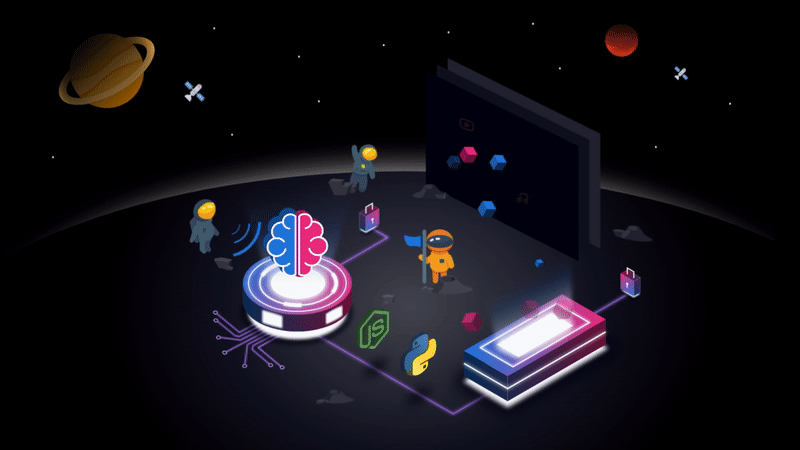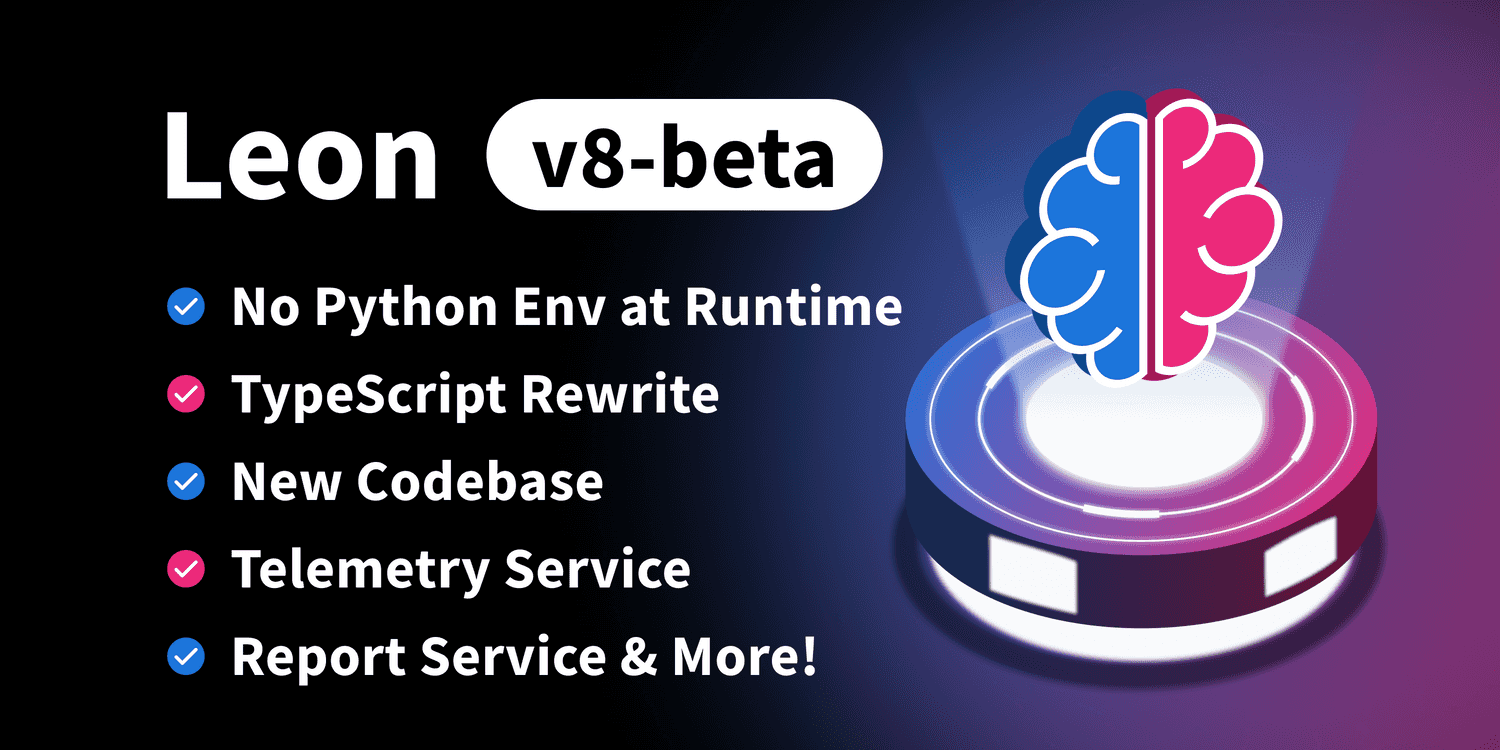
leon
🧠 Leon is your open-source personal assistant.
Stars: 16994
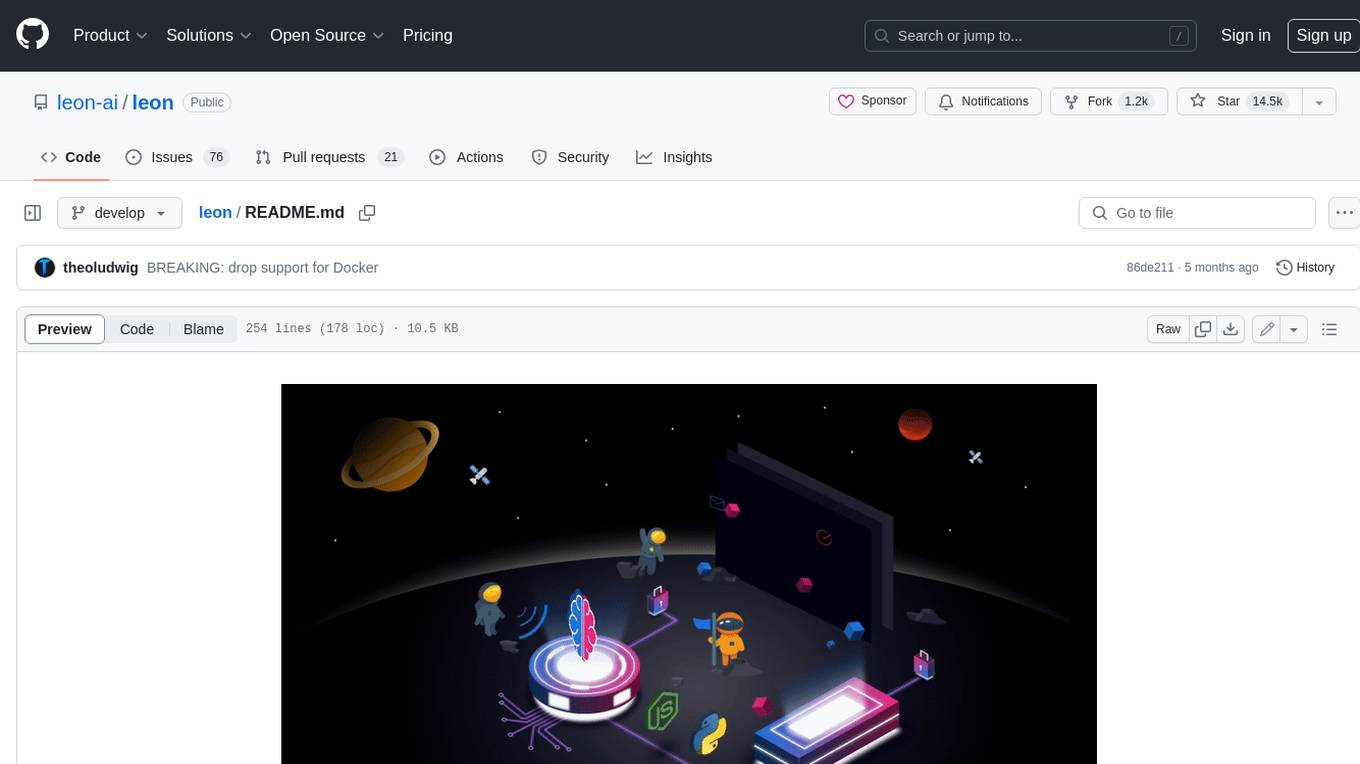
Leon is an open-source personal assistant who can live on your server. He does stuff when you ask him to. You can talk to him and he can talk to you. You can also text him and he can also text you. If you want to, Leon can communicate with you by being offline to protect your privacy.
README:
Your open-source personal assistant.
Website :: Documentation :: Roadmap :: Contributing :: Story
[!IMPORTANT] Leon is currently undergoing a massive architectural rewrite.
The
developbranch is highly experimental and may be unstable as I implement the new agentic core.
- If you are looking for the legacy, stable version (pre-LLM), please use the
masterbranch.- If you want to contribute to the future of Leon (LLMs, Agents, Automation), you are in the right place.
Please note that the current documentation and this README are outdated regarding the technical architecture. We are moving away from simple classification toward a hybrid approach involving Local LLMs, Transformers, and Atomic Tools. Updated documentation will be released alongside the new core stability.
I have been working on Leon since 2017. While development has been inconsistent in the past, the current era of AI unlocks capabilities that were previously impossible. I'm now transitioning Leon from a standard assistant to a fully autonomous personal AI assistant designed to be used by technical hobbyists to non-tech users.
I'm currently building the foundation for the next generation of Leon, focusing on 3 key milestones:
1. Workflow Architecture and Atomic Tools
We are restructuring Leon around a robust flow: Skills > Actions > Tools > Functions (> Binaries).
Instead of monolithic scripts, Leon will use atomic components (e.g. compiled binaries using ONNX runtime) to execute complex workflows.
- Example: a "Video Translator" skill won't just be a script; it will be a workflow where Leon orchestrates tools like vocal isolation, zero-shot voice cloning, ASR, audio gender recognition, etc. to achieve the result.
2. Autonomous Skill Generation (self-coding)
We are developing a meta-skill capable of writing code for new skills automatically.
- Leon will analyze a request, check if a skill exists, and if not, write the code itself following our strict architectural standards.
- It will leverage existing tools and inject the new skill directly into its memory for future reuse.
3. Agentic Behavior (ReAct) and Local LLM Optimization
The ultimate phase will be to adopt the ReAct (Reason + Act) approach.
- Leon will be provided with low-level tools (organized in toolkits, e.g.,
music_audiocontaining FFmpeg). - Using Local LLMs, Leon will loop through thoughts and actions to solve problems dynamically.
- Optimization: we are implementing strict context filtering to save tokens, reduce hallucinations, and ensure high performance on local hardware.
Get Involved
Join us on Discord to ask questions, or express interest in becoming an active contributor.
- Check out the roadmap for more information on our upcoming plans.
- Watch a preview of our last progress to see what we've been working on.
I'm taking a lot of time to work on the new core of Leon due to personal reasons. I can only work on it during my spare time. Hence, I'm blocking any contribution as the whole core of Leon is coming with many breaking changes. Many of you are willing to contribute in Leon (create new skills, help to improve the core, translations and so on...), a big thanks to every one of you!
While I would love to devote more time to Leon, I'm currently unable to do so because I have bills to pay. I have some ideas about how to monetize Leon in the future (Leon's core will always remain open source), but before to get there there is still a long way to go.
Until then, any financial support by sponsoring Leon is much appreciated 🙂
Check out the latest release blog post.
Leon is an open-source personal assistant who can live on your server.
He does stuff when you ask him to.
You can talk to him and he can talk to you. You can also text him and he can also text you. If you want to, Leon can communicate with you by being offline to protect your privacy.
- If you are a developer (or not), you may want to build many things that could help in your daily life. Instead of building a dedicated project for each of those ideas, Leon can help you with his Skills structure.
- With this generic structure, everyone can create their own skills and share them with others. Therefore there is only one core (to rule them all).
- Leon uses AI concepts, which is cool.
- Privacy matters, you can configure Leon to talk with him offline. You can already text with him without any third party services.
- Open source is great.
This repository contains the following nodes of Leon:
- The server
- Skills
- The web app
- The hotword node
- The TCP server (for inter-process communication between Leon and third-party nodes such as spaCy)
- The Python bridge (the connector between the core and skills made with Python)
Today, the most interesting part is about his core and the way he can scale up. He is pretty young but can easily scale to have new features (skills). You can find what he is able to do by browsing the skills list.
Please do know that after the official release, we will build many skills along with the community. Feel free to join us on Discord to be part of the journey.
Sounds good to you? Then let's get started!
Gitpod will automatically set up an environment and run an instance for you.
To install these prerequisites, you can follow the How To section of the documentation.
# Install the Leon CLI
npm install --global @leon-ai/cli
# Install Leon (stable branch)
leon create birth
# OR install from the develop branch: leon create birth --develop# Check the setup went well
leon check
# Run
leon start
# Go to http://localhost:1337
# Hooray! Leon is runningFor full documentation, visit docs.getleon.ai.
I'm documenting the journey on YouTube in developing our dear Leon. I also take you along in my daily life here in China.
For non-French speakers, translated English subtitles are available.
To know what is going on, follow roadmap.getleon.ai.
If you have an idea for improving Leon, do not hesitate.
Leon needs open source to live, the more skills he has, the more skillful he becomes.
You'll find a write-up on this blog post.
Louis Grenard (@grenlouis)
 Appwrite
Appwrite
250 USD / month |
 Anonymous
Anonymous
100 USD / month |
 herbundkraut
herbundkraut
10 USD / month |
You? |
You can also contribute by sponsoring Leon.
Please note that I dedicate most of my free time to Leon.
By sponsoring the project you make the project sustainable and faster to develop features.
The focus is not only limited to the activity you see on GitHub but also a lot of thinking about the direction of the project. Which is naturally related to the overall design, architecture, vision, learning process and so on...



Copyright (c) 2019-present, Louis Grenard [email protected]
For Tasks:
Click tags to check more tools for each tasksFor Jobs:
Alternative AI tools for leon
Similar Open Source Tools

leon
Leon is an open-source personal assistant who can live on your server. He does stuff when you ask him to. You can talk to him and he can talk to you. You can also text him and he can also text you. If you want to, Leon can communicate with you by being offline to protect your privacy.
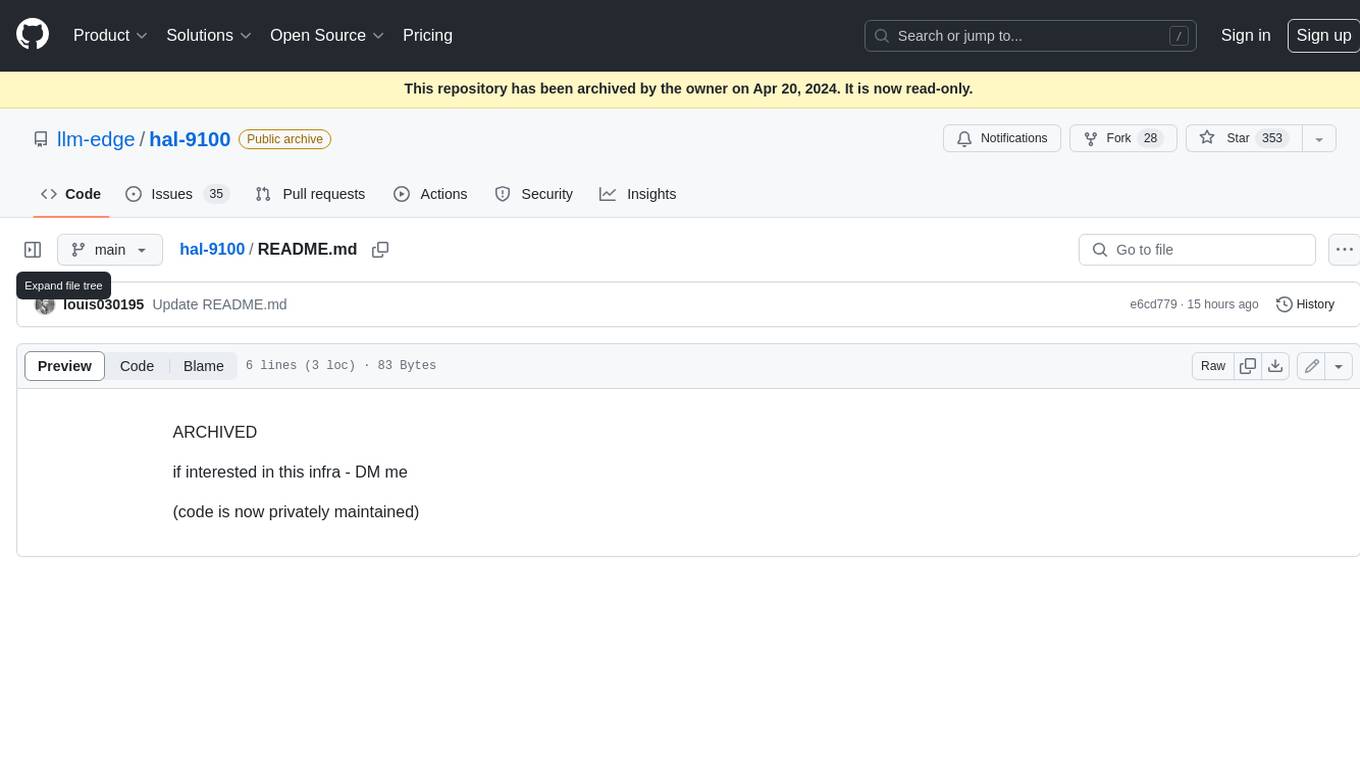
hal-9100
This repository is now archived and the code is privately maintained. If you are interested in this infrastructure, please contact the maintainer directly.
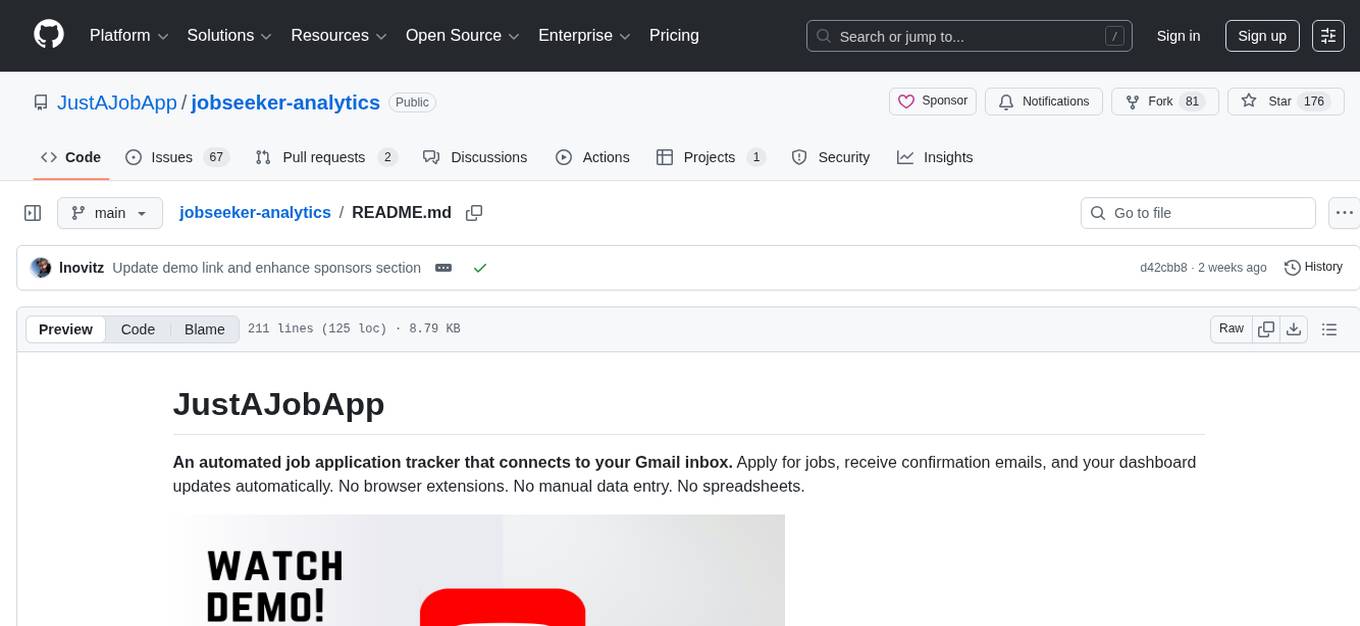
jobseeker-analytics
JustAJobApp is an automated job application tracker that connects to your Gmail inbox, allowing users to apply for jobs, receive confirmation emails, and update their dashboard automatically. It eliminates the need for browser extensions, manual data entry, and spreadsheets. The tool aims to prevent job seekers from missing opportunities due to tracking errors, increase application volume, and streamline the job search process. JustAJobApp prioritizes privacy by not reading emails, ensuring data is not for sale, and storing only necessary metadata. It is open source for public audit and offers features like interview prep and real-time visibility for career coaches.
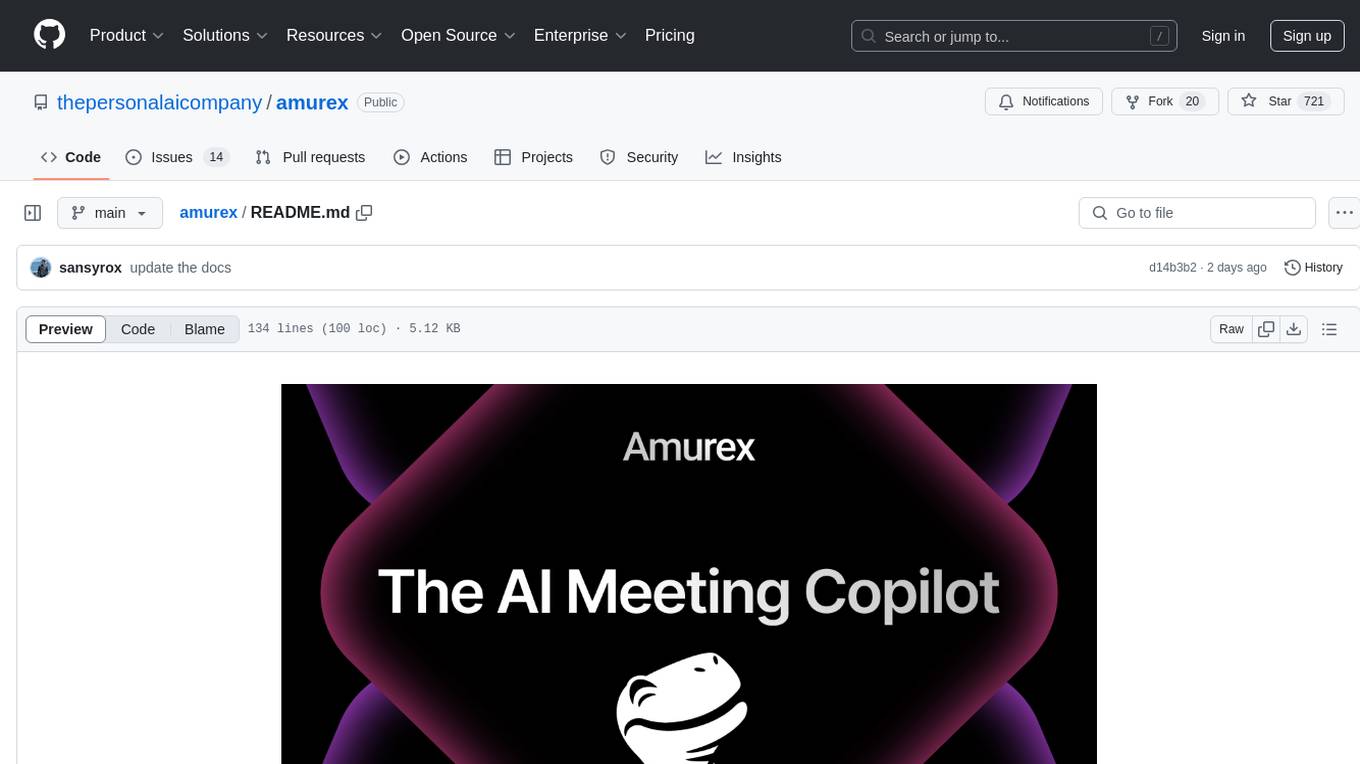
amurex
Amurex is a powerful AI meeting assistant that integrates seamlessly into your workflow. It ensures you never miss details, stay on top of action items, and make meetings more productive. With real-time suggestions, smart summaries, and follow-up emails, Amurex acts as your personal copilot. It is open-source, transparent, secure, and privacy-focused, providing a seamless AI-driven experience to take control of your meetings and focus on what truly matters.
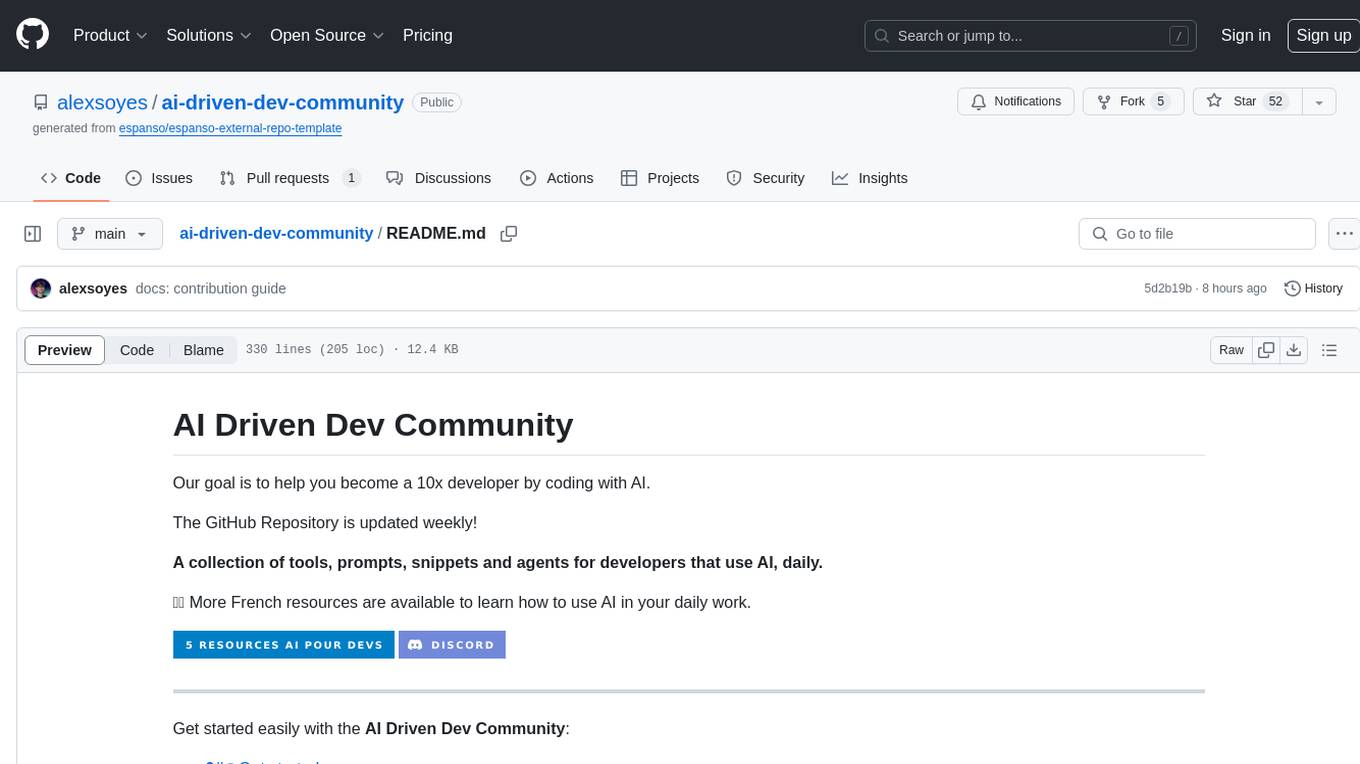
ai-driven-dev-community
AI Driven Dev Community is a repository aimed at helping developers become more efficient by utilizing AI tools in their daily coding tasks. It provides a collection of tools, prompts, snippets, and agents for developers to integrate AI into their workflow. The repository is regularly updated with new resources and focuses on best practices for using AI in development work. Users can find tools like Espanso, ChatGPT, GitHub Copilot, and VSCode recommended for enhancing their coding experience. Additionally, the repository offers guidance on customizing AI for developers, installing AI toolbox for software engineers, and contributing to the community through easy steps.

plandex
Plandex is an open source, terminal-based AI coding engine designed for complex tasks. It uses long-running agents to break up large tasks into smaller subtasks, helping users work through backlogs, navigate unfamiliar technologies, and save time on repetitive tasks. Plandex supports various AI models, including OpenAI, Anthropic Claude, Google Gemini, and more. It allows users to manage context efficiently in the terminal, experiment with different approaches using branches, and review changes before applying them. The tool is platform-independent and runs from a single binary with no dependencies.

Magick
Magick is a groundbreaking visual AIDE (Artificial Intelligence Development Environment) for no-code data pipelines and multimodal agents. Magick can connect to other services and comes with nodes and templates well-suited for intelligent agents, chatbots, complex reasoning systems and realistic characters.
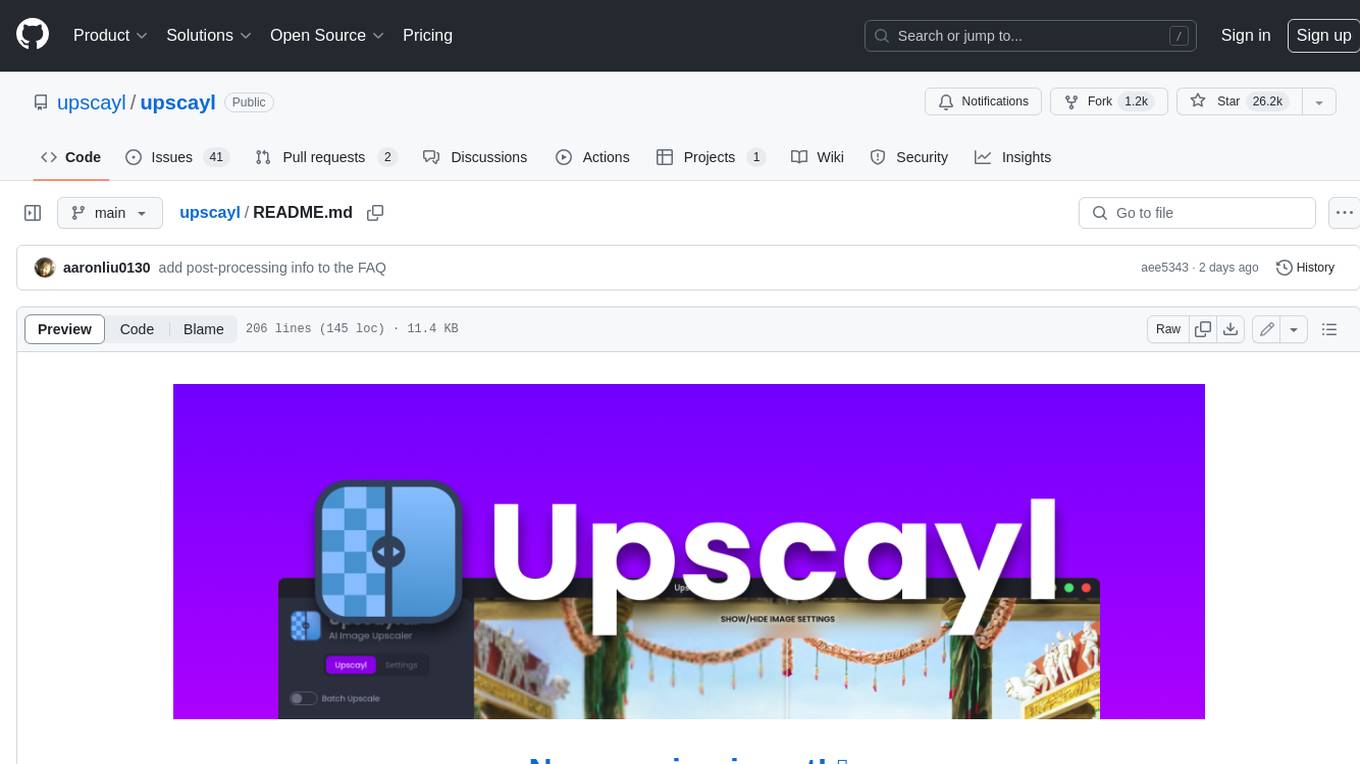
upscayl
Upscayl is a free and open-source AI image upscaler that uses advanced AI algorithms to enlarge and enhance low-resolution images without losing quality. It is a cross-platform application built with the Linux-first philosophy, available on all major desktop operating systems. Upscayl utilizes Real-ESRGAN and Vulkan architecture for image enhancement, and its backend is fully open-source under the AGPLv3 license. It is important to note that a Vulkan compatible GPU is required for Upscayl to function effectively.

sweep
Sweep is an AI junior developer that turns bugs and feature requests into code changes. It automatically handles developer experience improvements like adding type hints and improving test coverage.
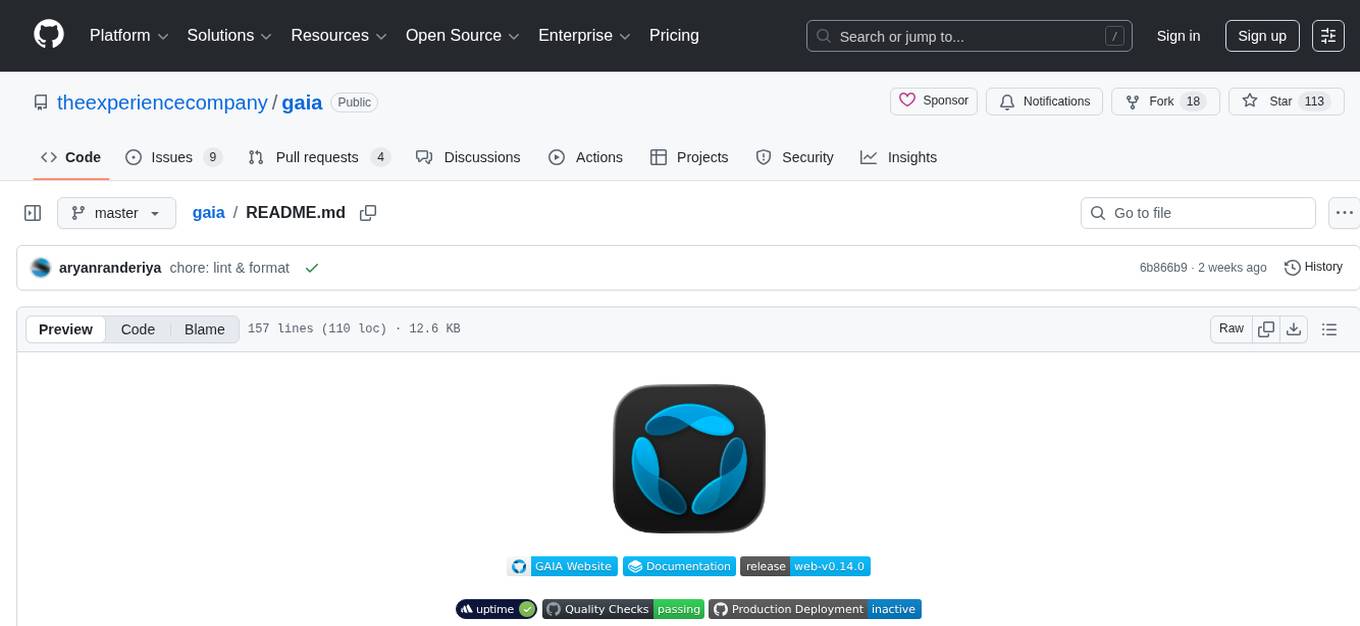
gaia
Gaia is a powerful open-source tool for managing infrastructure as code. It allows users to define and provision cloud resources using simple configuration files. With Gaia, you can automate the deployment and scaling of your applications, ensuring consistency and reliability across your infrastructure. The tool supports multiple cloud providers and offers a user-friendly interface for managing your resources efficiently. Gaia simplifies the process of infrastructure management, making it easier for teams to collaborate and deploy applications seamlessly.
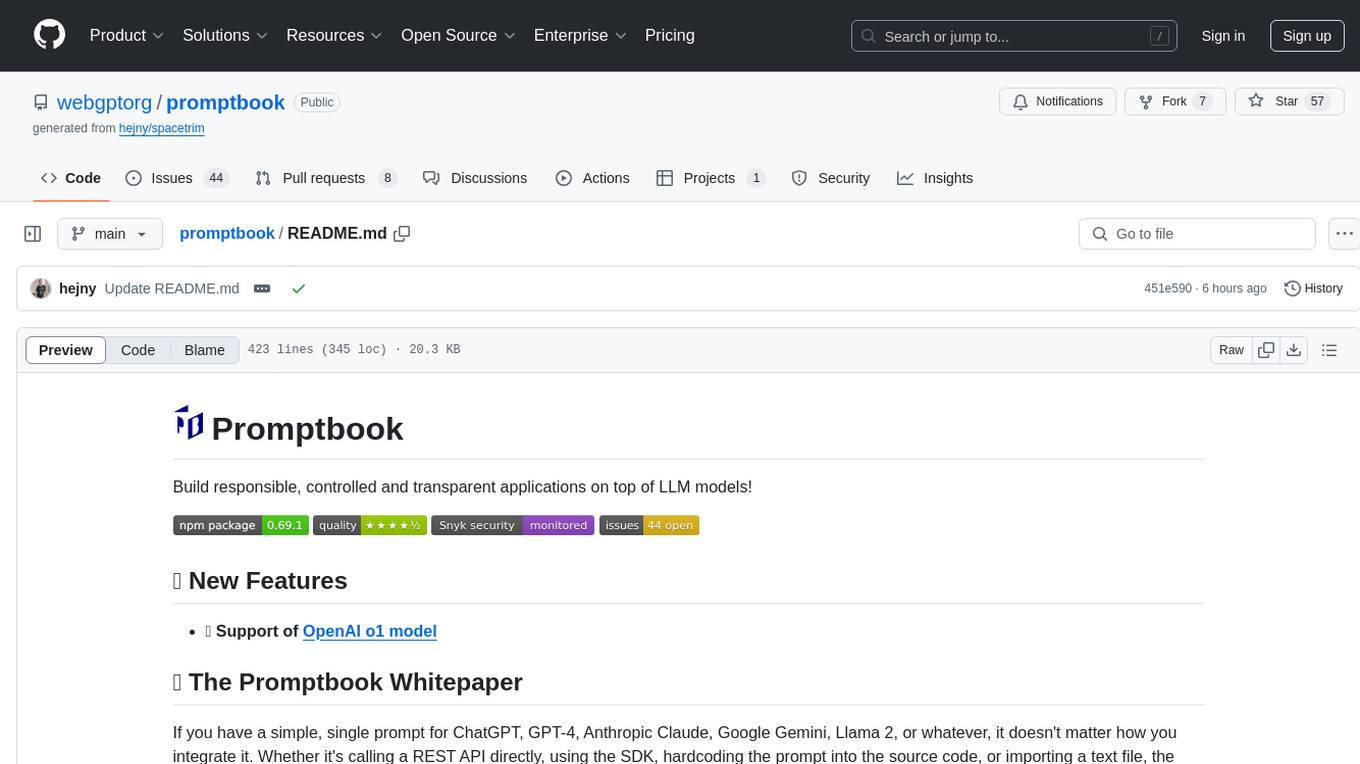
promptbook
Promptbook is a library designed to build responsible, controlled, and transparent applications on top of large language models (LLMs). It helps users overcome limitations of LLMs like hallucinations, off-topic responses, and poor quality output by offering features such as fine-tuning models, prompt-engineering, and orchestrating multiple prompts in a pipeline. The library separates concerns, establishes a common format for prompt business logic, and handles low-level details like model selection and context size. It also provides tools for pipeline execution, caching, fine-tuning, anomaly detection, and versioning. Promptbook supports advanced techniques like Retrieval-Augmented Generation (RAG) and knowledge utilization to enhance output quality.
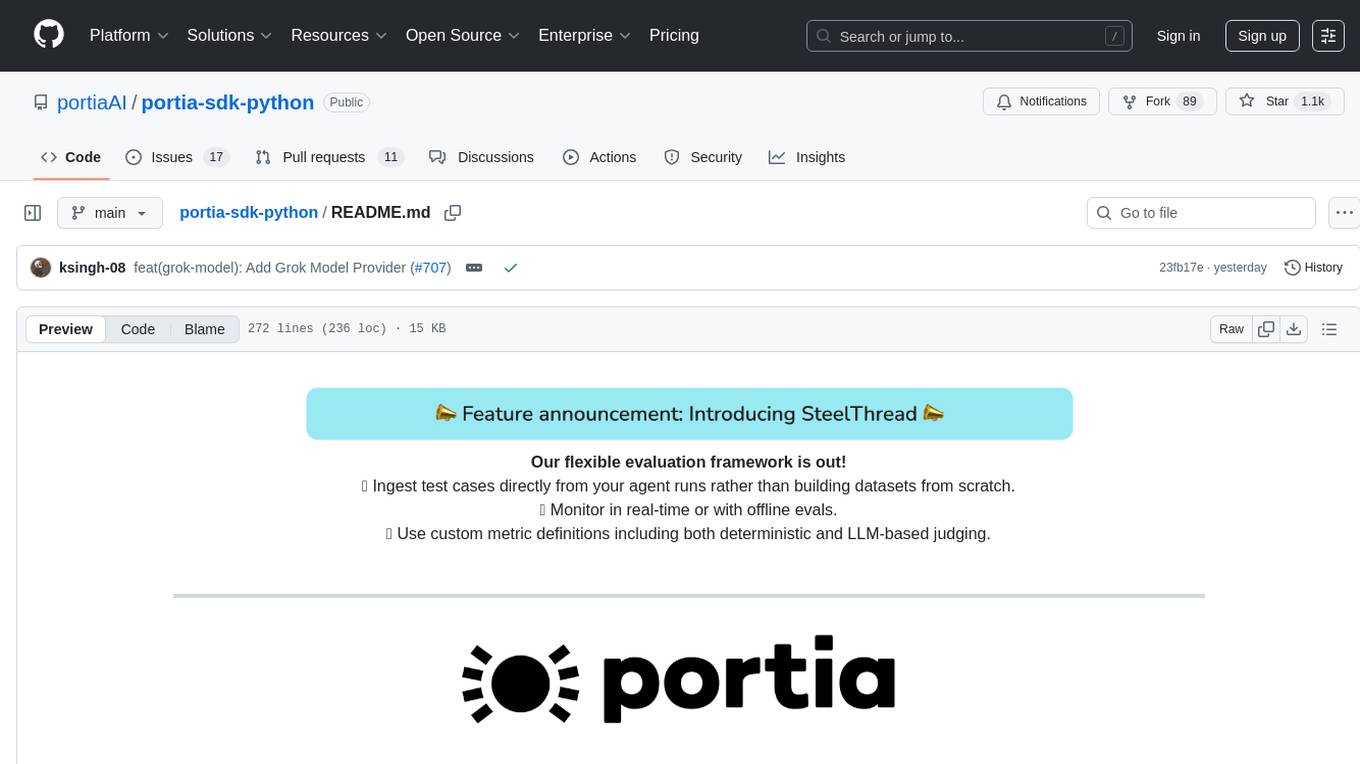
portia-sdk-python
Portia AI is an open source developer framework for predictable, stateful, authenticated agentic workflows. It allows developers to have oversight over their multi-agent deployments and focuses on production readiness. The framework supports iterating on agents' reasoning, extensive tool support including MCP support, authentication for API and web agents, and is production-ready with features like attribute multi-agent runs, large inputs and outputs storage, and connecting any LLM. Portia AI aims to provide a flexible and reliable platform for developing AI agents with tools, authentication, and smart control.

nexent
Nexent is a powerful tool for analyzing and visualizing network traffic data. It provides comprehensive insights into network behavior, helping users to identify patterns, anomalies, and potential security threats. With its user-friendly interface and advanced features, Nexent is suitable for network administrators, cybersecurity professionals, and anyone looking to gain a deeper understanding of their network infrastructure.
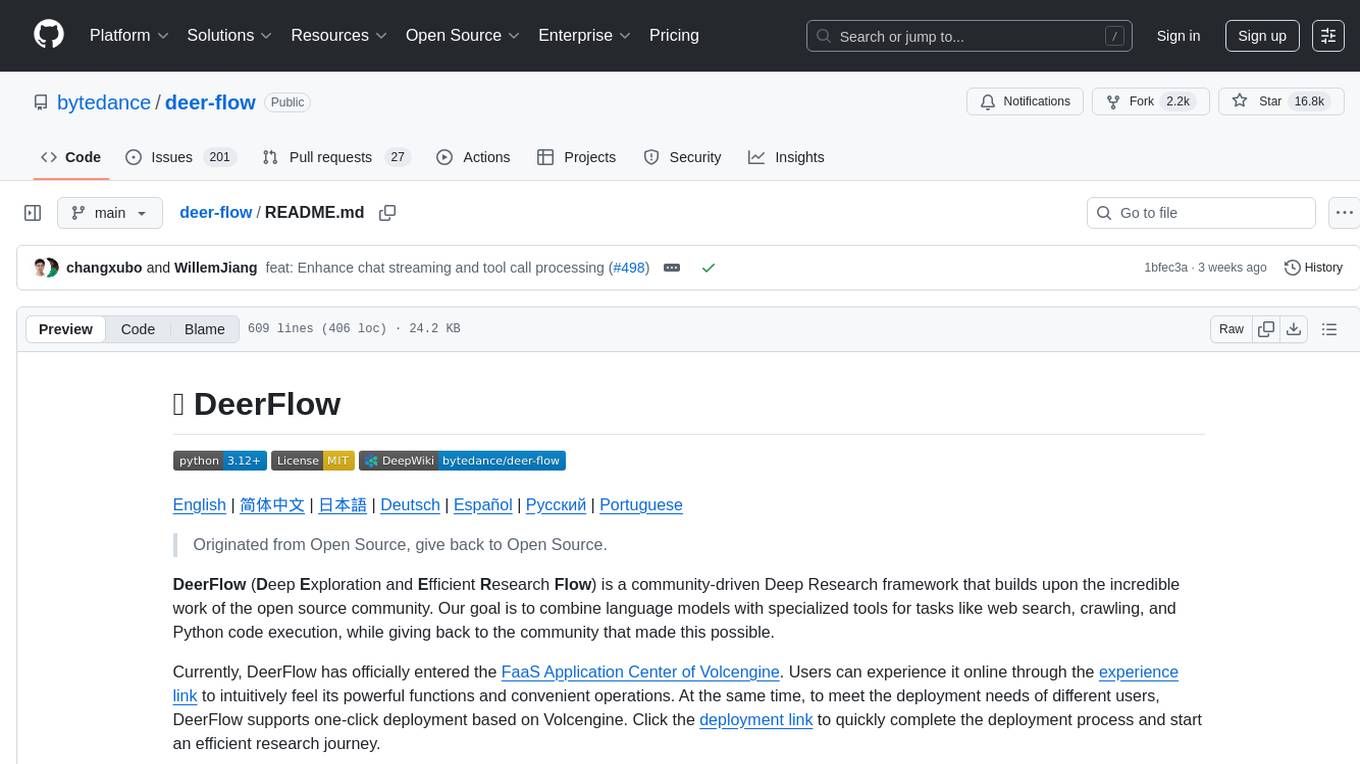
deer-flow
DeerFlow is a community-driven Deep Research framework that combines language models with specialized tools for tasks like web search, crawling, and Python code execution. It supports FaaS deployment and one-click deployment based on Volcengine. The framework includes core capabilities like LLM integration, search and retrieval, RAG integration, MCP seamless integration, human collaboration, report post-editing, and content creation. The architecture is based on a modular multi-agent system with components like Coordinator, Planner, Research Team, and Text-to-Speech integration. DeerFlow also supports interactive mode, human-in-the-loop mechanism, and command-line arguments for customization.
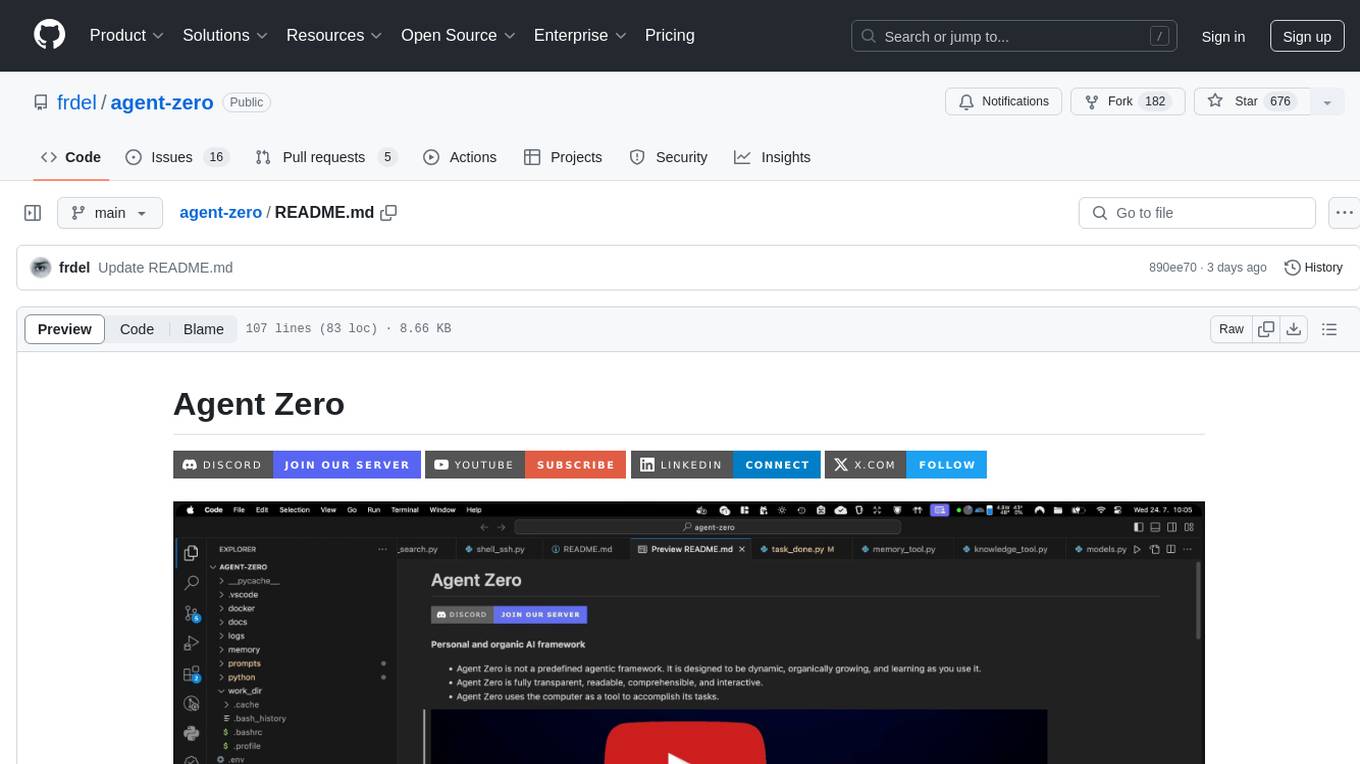
agent-zero
Agent Zero is a personal and organic AI framework designed to be dynamic, organically growing, and learning as you use it. It is fully transparent, readable, comprehensible, customizable, and interactive. The framework uses the computer as a tool to accomplish tasks, with no single-purpose tools pre-programmed. It emphasizes multi-agent cooperation, complete customization, and extensibility. Communication is key in this framework, allowing users to give proper system prompts and instructions to achieve desired outcomes. Agent Zero is capable of dangerous actions and should be run in an isolated environment. The framework is prompt-based, highly customizable, and requires a specific environment to run effectively.
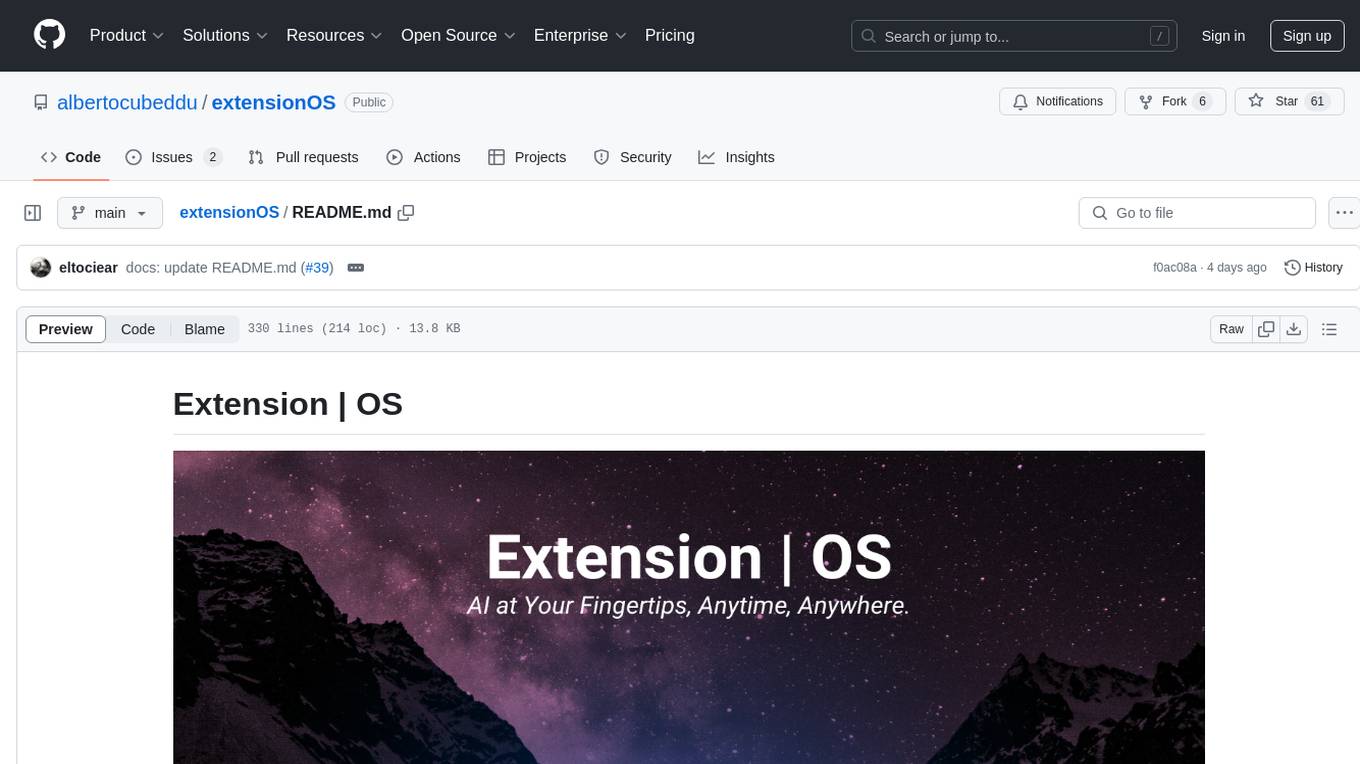
extensionOS
Extension | OS is an open-source browser extension that brings AI directly to users' web browsers, allowing them to access powerful models like LLMs seamlessly. Users can create prompts, fix grammar, and access intelligent assistance without switching tabs. The extension aims to revolutionize online information interaction by integrating AI into everyday browsing experiences. It offers features like Prompt Factory for tailored prompts, seamless LLM model access, secure API key storage, and a Mixture of Agents feature. The extension was developed to empower users to unleash their creativity with custom prompts and enhance their browsing experience with intelligent assistance.
For similar tasks

leon
Leon is an open-source personal assistant who can live on your server. He does stuff when you ask him to. You can talk to him and he can talk to you. You can also text him and he can also text you. If you want to, Leon can communicate with you by being offline to protect your privacy.
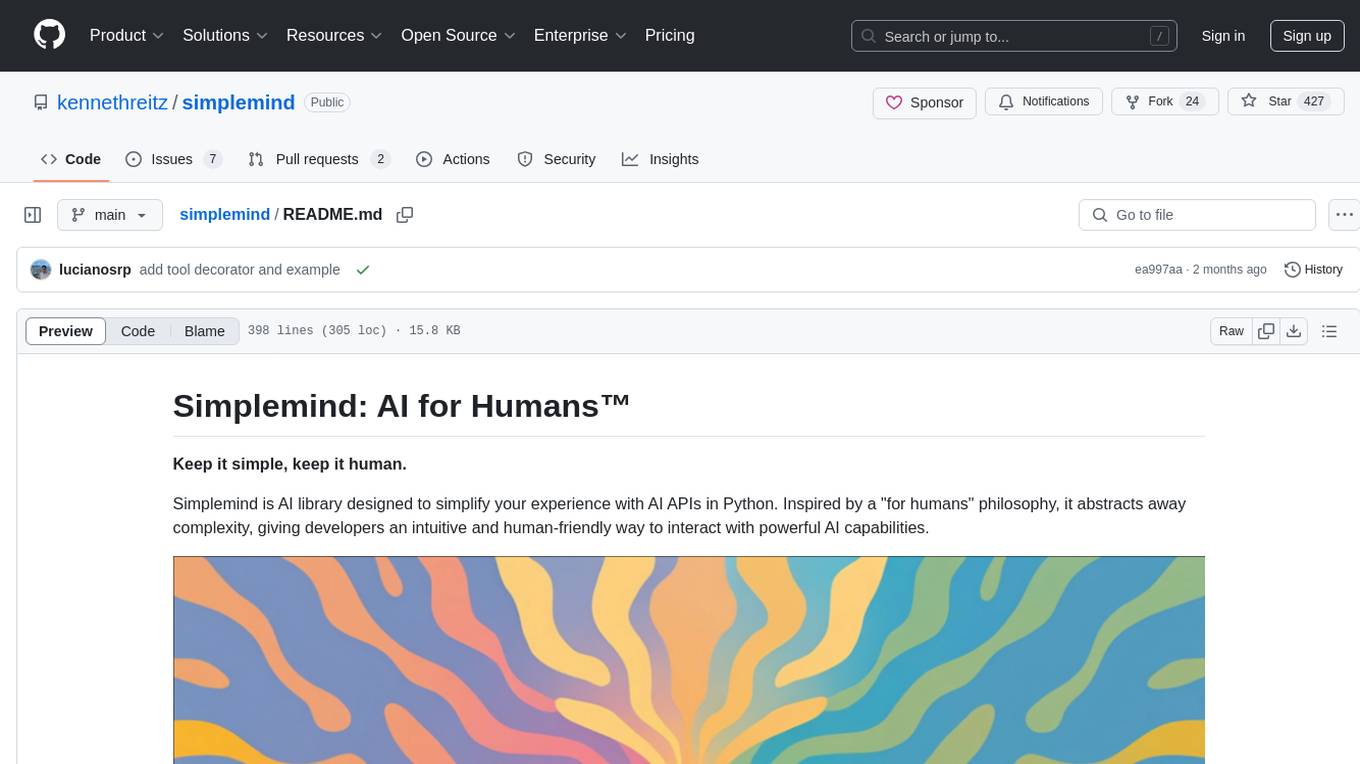
simplemind
Simplemind is an AI library designed to simplify the experience with AI APIs in Python. It provides easy-to-use AI tools with a human-centered design and minimal configuration. Users can tap into powerful AI capabilities through simple interfaces, without needing to be experts. The library supports various APIs from different providers/models and offers features like text completion, streaming text, structured data handling, conversational AI, tool calling, and logging. Simplemind aims to make AI models accessible to all by abstracting away complexity and prioritizing readability and usability.
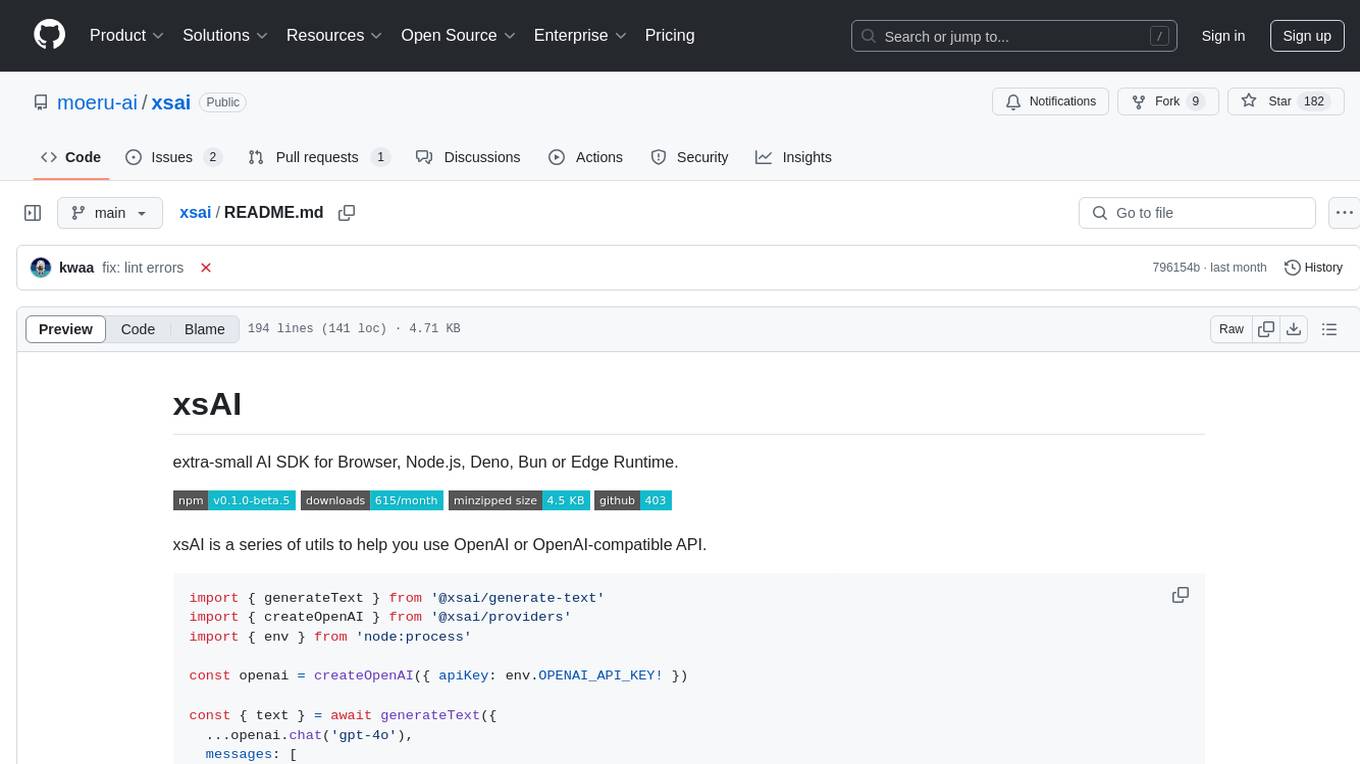
xsai
xsAI is an extra-small AI SDK designed for Browser, Node.js, Deno, Bun, or Edge Runtime. It provides a series of utils to help users utilize OpenAI or OpenAI-compatible APIs. The SDK is lightweight and efficient, using a variety of methods to minimize its size. It is runtime-agnostic, working seamlessly across different environments without depending on Node.js Built-in Modules. Users can easily install specific utils like generateText or streamText, and leverage tools like weather to perform tasks such as getting the weather in a location.
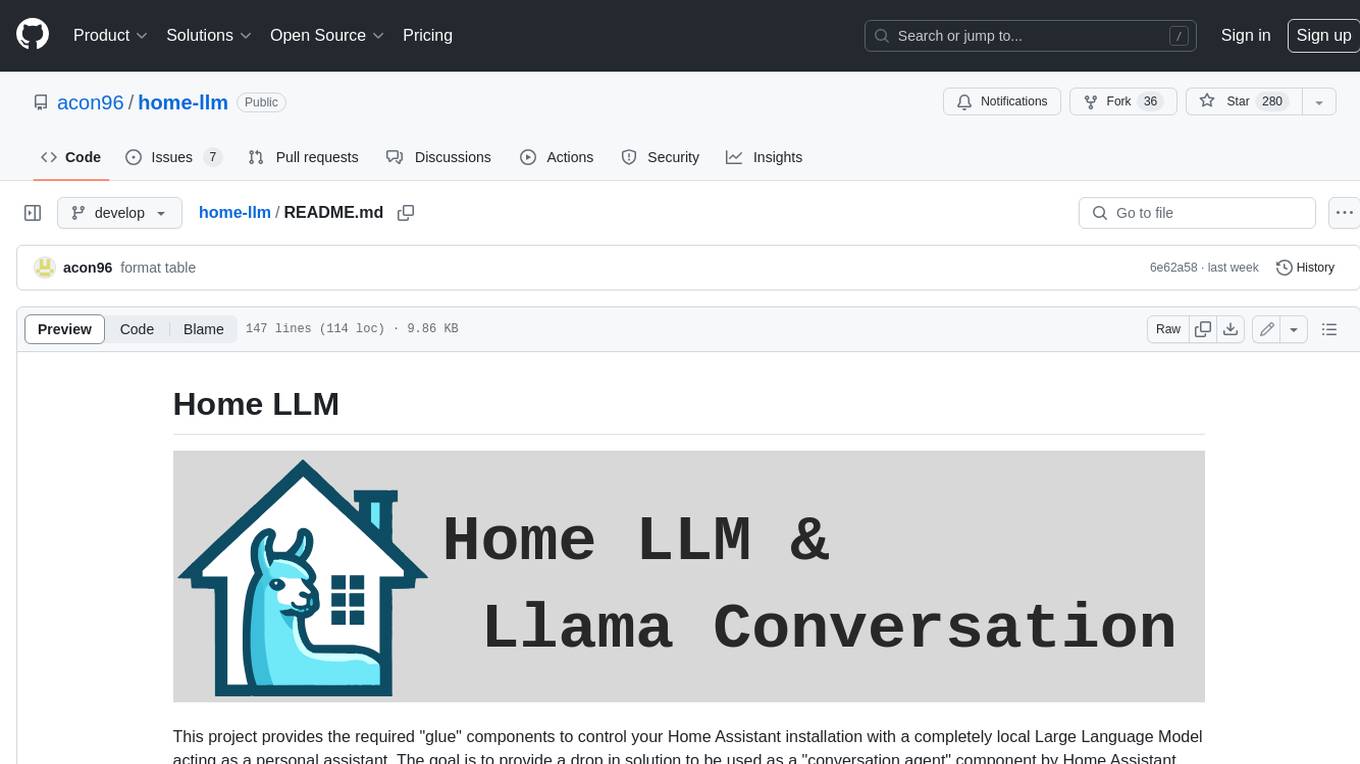
home-llm
Home LLM is a project that provides the necessary components to control your Home Assistant installation with a completely local Large Language Model acting as a personal assistant. The goal is to provide a drop-in solution to be used as a "conversation agent" component by Home Assistant. The 2 main pieces of this solution are Home LLM and Llama Conversation. Home LLM is a fine-tuning of the Phi model series from Microsoft and the StableLM model series from StabilityAI. The model is able to control devices in the user's house as well as perform basic question and answering. The fine-tuning dataset is a custom synthetic dataset designed to teach the model function calling based on the device information in the context. Llama Conversation is a custom component that exposes the locally running LLM as a "conversation agent" in Home Assistant. This component can be interacted with in a few ways: using a chat interface, integrating with Speech-to-Text and Text-to-Speech addons, or running the oobabooga/text-generation-webui project to provide access to the LLM via an API interface.
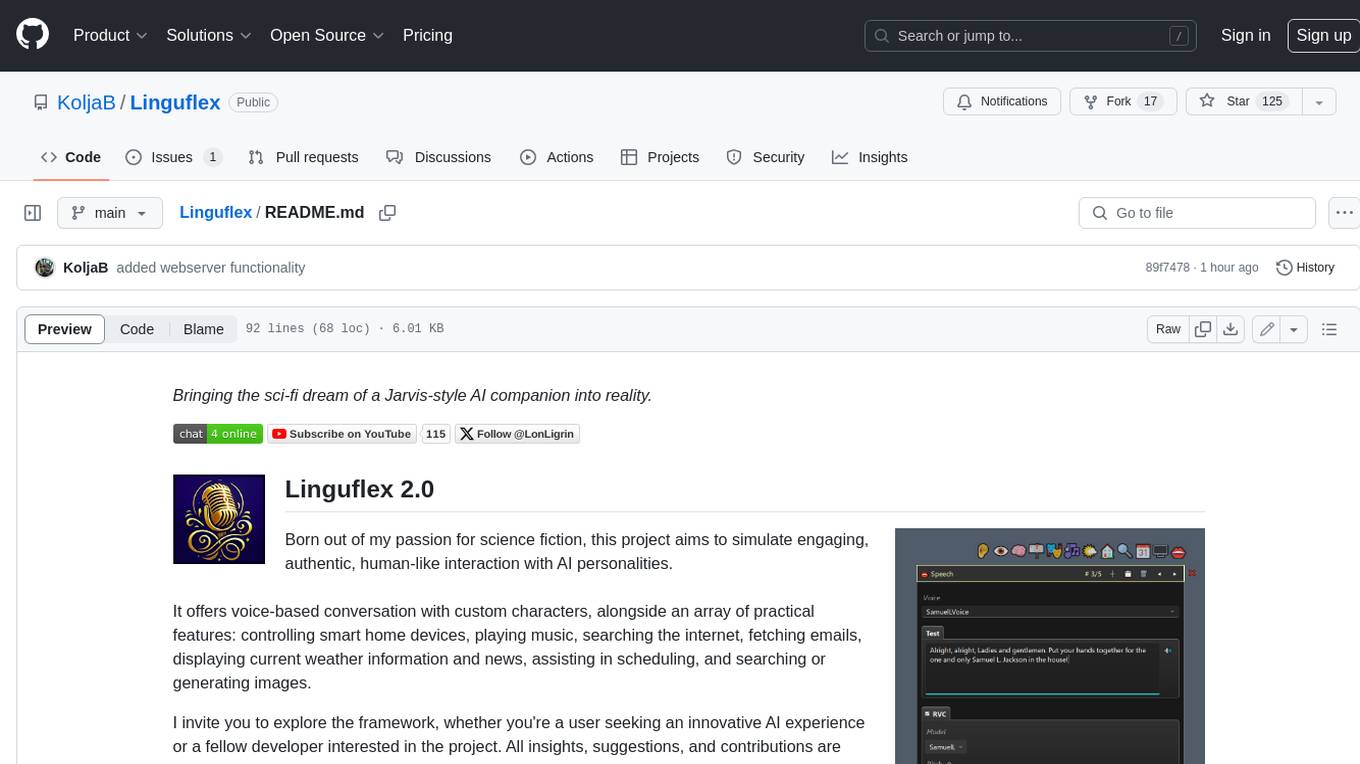
Linguflex
Linguflex is a project that aims to simulate engaging, authentic, human-like interaction with AI personalities. It offers voice-based conversation with custom characters, alongside an array of practical features such as controlling smart home devices, playing music, searching the internet, fetching emails, displaying current weather information and news, assisting in scheduling, and searching or generating images.
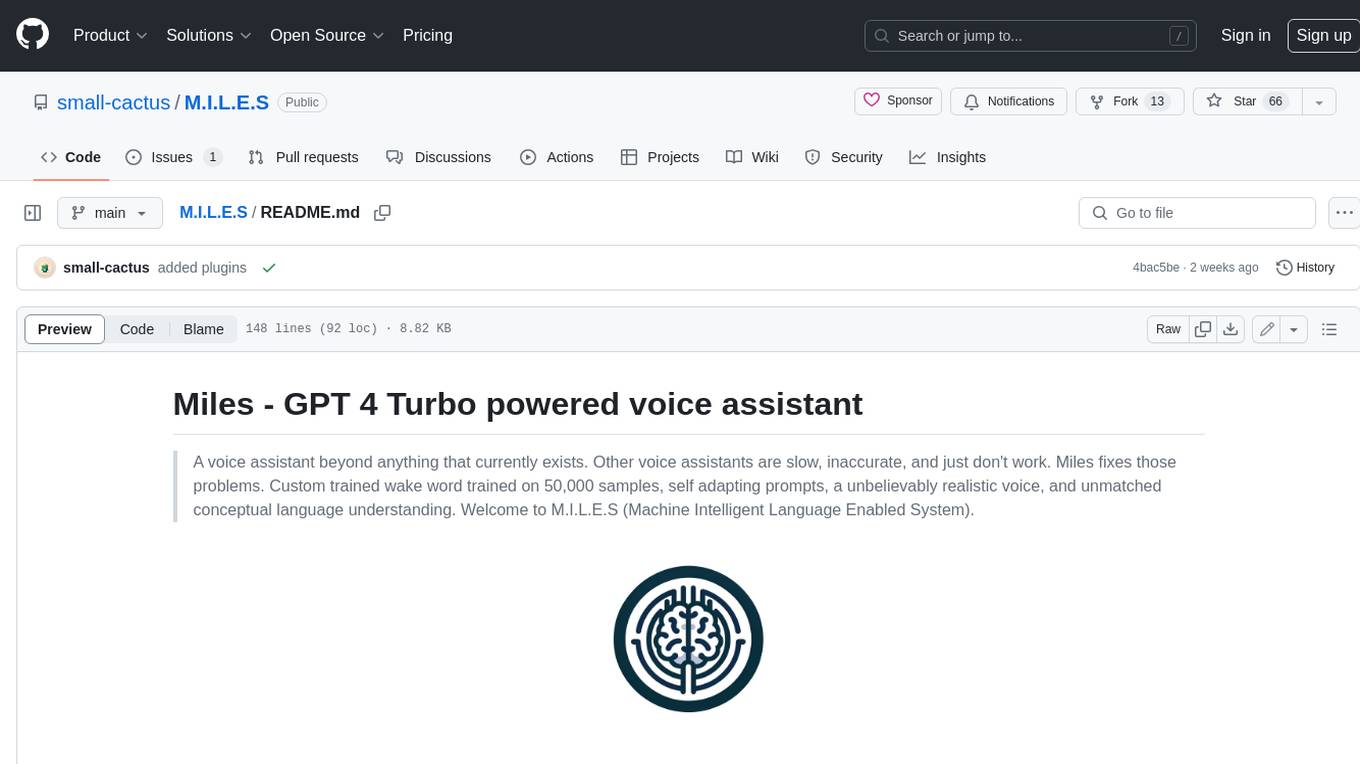
M.I.L.E.S
M.I.L.E.S. (Machine Intelligent Language Enabled System) is a voice assistant powered by GPT-4 Turbo, offering a range of capabilities beyond existing assistants. With its advanced language understanding, M.I.L.E.S. provides accurate and efficient responses to user queries. It seamlessly integrates with smart home devices, Spotify, and offers real-time weather information. Additionally, M.I.L.E.S. possesses persistent memory, a built-in calculator, and multi-tasking abilities. Its realistic voice, accurate wake word detection, and internet browsing capabilities enhance the user experience. M.I.L.E.S. prioritizes user privacy by processing data locally, encrypting sensitive information, and adhering to strict data retention policies.
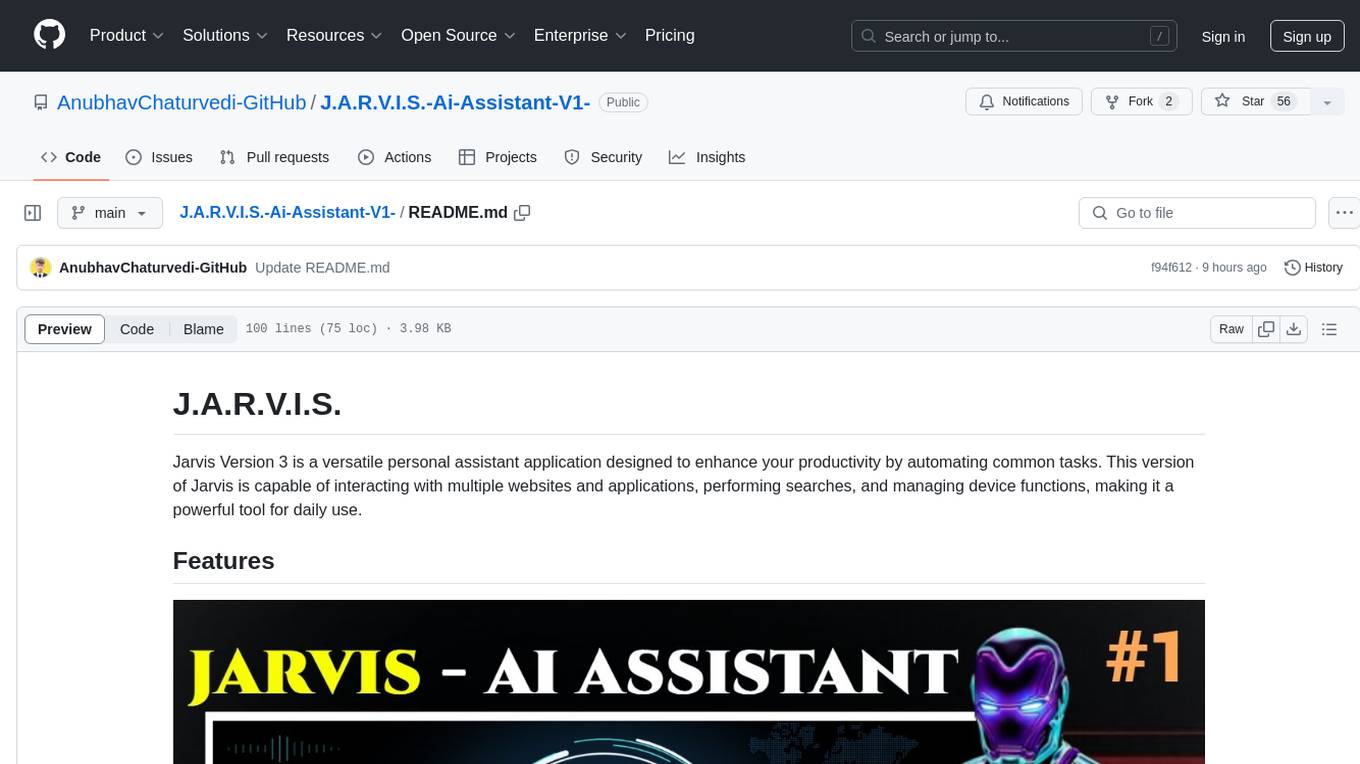
J.A.R.V.I.S.-Ai-Assistant-V1-
Jarvis Version 3 is a versatile personal assistant application designed to enhance productivity by automating common tasks. It can interact with websites and applications, perform searches, manage device functions, and control music. Users can give commands to open websites, search on Google or YouTube, scroll pages, manage applications, check time, internet speed, battery percentage, battery alerts, charging status, play music, and synchronize clapping with music. The tool offers features for web navigation, search functionality, scrolling, application management, device management, and music control.
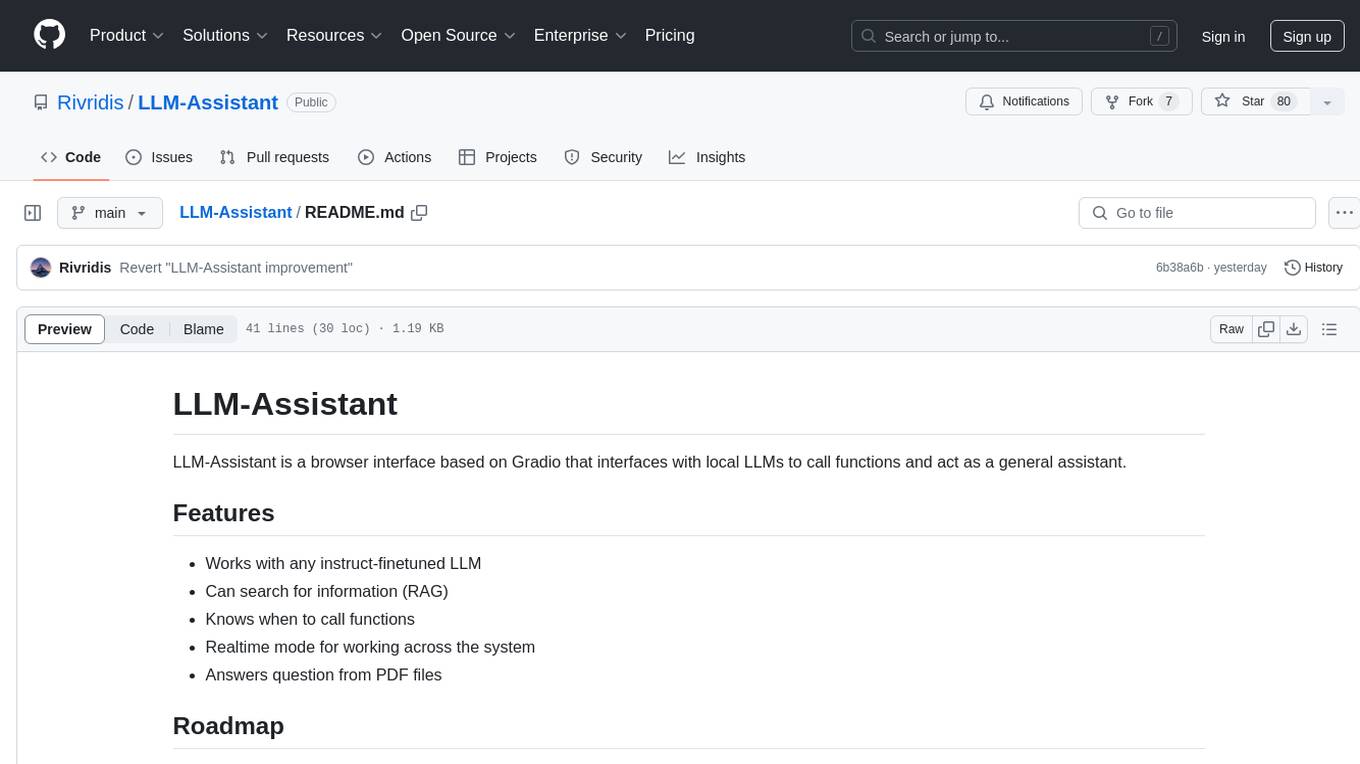
LLM-Assistant
LLM-Assistant is a browser interface based on Gradio that interfaces with local LLMs to call functions and act as a general assistant. It works with any instruct-finetuned LLM, can search for information (RAG), knows when to call functions, has realtime mode for working across the system, and answers questions from PDF files. The tool aims to provide voice access and more functions in the future. Current bugs include rare crashes. Setup involves cloning the repo to a virtual environment, installing requirements, downloading and placing LLM model in the model folder, and running main.py. Usage includes Assistant mode for general chat and calling functions like playing music, as well as Realtime mode for editing documents or replying to emails in real-time.
For similar jobs

leon
Leon is an open-source personal assistant who can live on your server. He does stuff when you ask him to. You can talk to him and he can talk to you. You can also text him and he can also text you. If you want to, Leon can communicate with you by being offline to protect your privacy.
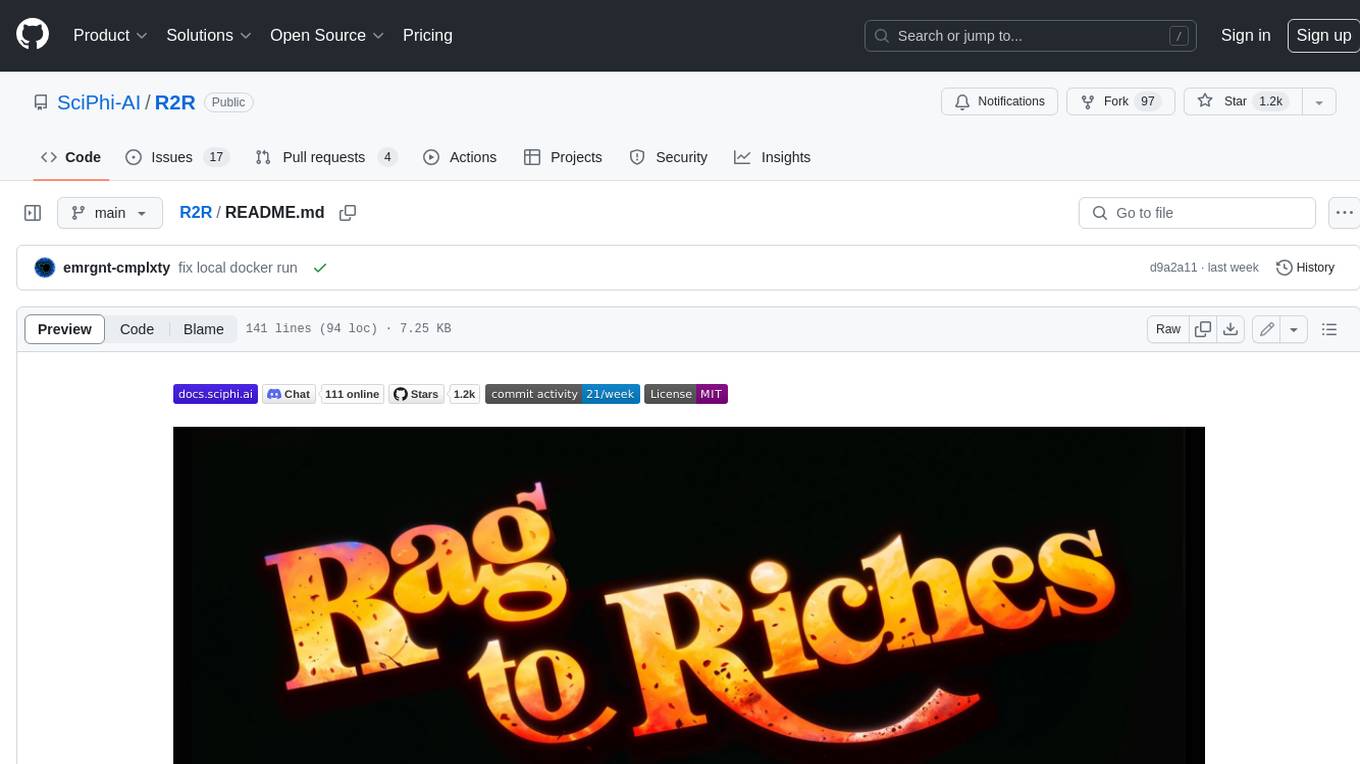
R2R
R2R (RAG to Riches) is a fast and efficient framework for serving high-quality Retrieval-Augmented Generation (RAG) to end users. The framework is designed with customizable pipelines and a feature-rich FastAPI implementation, enabling developers to quickly deploy and scale RAG-based applications. R2R was conceived to bridge the gap between local LLM experimentation and scalable production solutions. **R2R is to LangChain/LlamaIndex what NextJS is to React**. A JavaScript client for R2R deployments can be found here. ### Key Features * **🚀 Deploy** : Instantly launch production-ready RAG pipelines with streaming capabilities. * **🧩 Customize** : Tailor your pipeline with intuitive configuration files. * **🔌 Extend** : Enhance your pipeline with custom code integrations. * **⚖️ Autoscale** : Scale your pipeline effortlessly in the cloud using SciPhi. * **🤖 OSS** : Benefit from a framework developed by the open-source community, designed to simplify RAG deployment.
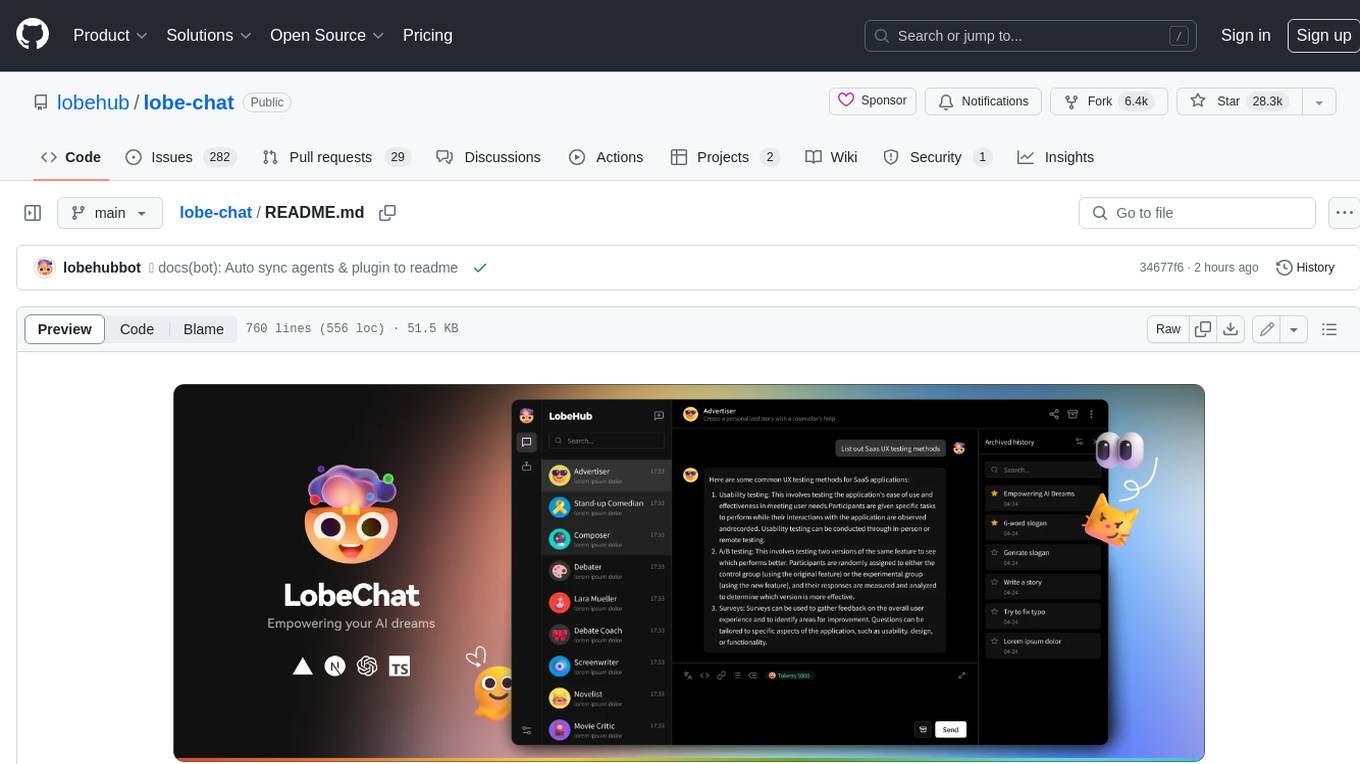
lobe-chat
Lobe Chat is an open-source, modern-design ChatGPT/LLMs UI/Framework. Supports speech-synthesis, multi-modal, and extensible ([function call][docs-functionc-call]) plugin system. One-click **FREE** deployment of your private OpenAI ChatGPT/Claude/Gemini/Groq/Ollama chat application.
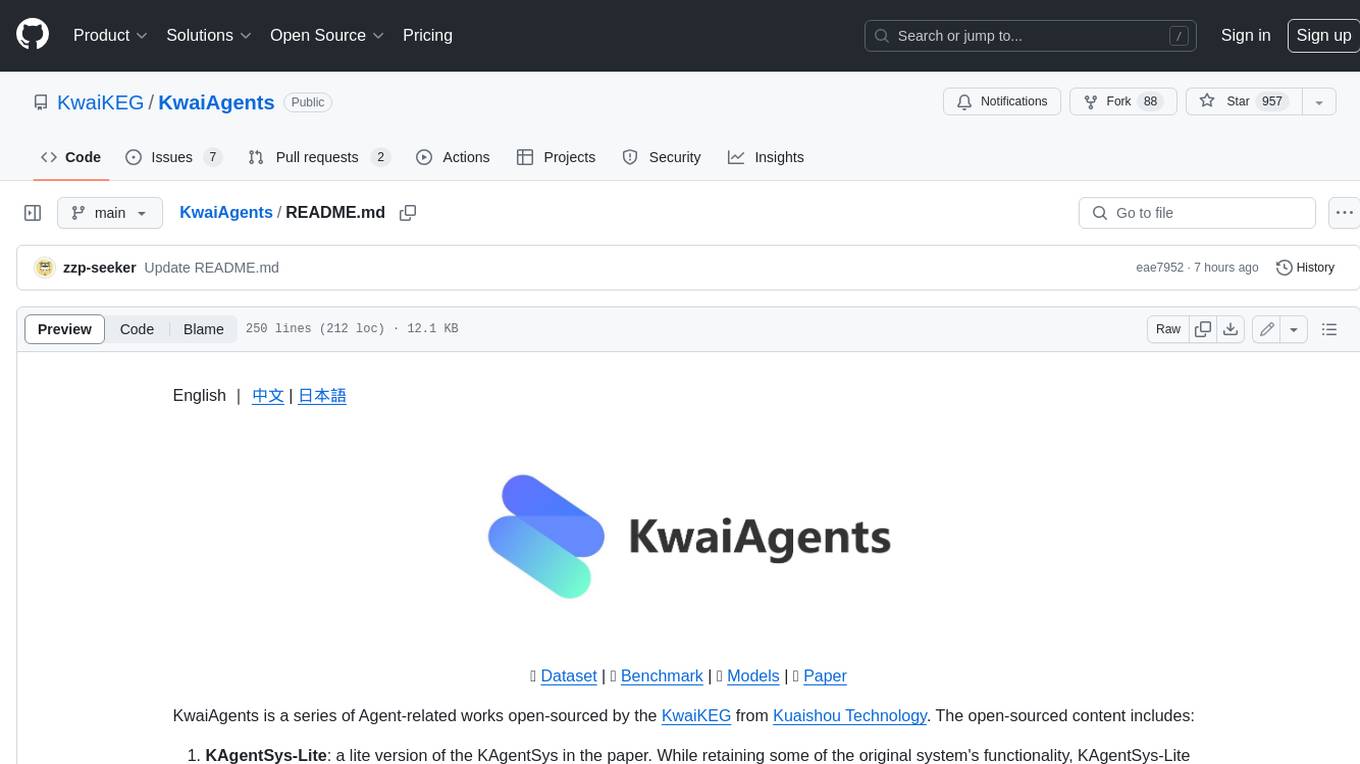
KwaiAgents
KwaiAgents is a series of Agent-related works open-sourced by the [KwaiKEG](https://github.com/KwaiKEG) from [Kuaishou Technology](https://www.kuaishou.com/en). The open-sourced content includes: 1. **KAgentSys-Lite**: a lite version of the KAgentSys in the paper. While retaining some of the original system's functionality, KAgentSys-Lite has certain differences and limitations when compared to its full-featured counterpart, such as: (1) a more limited set of tools; (2) a lack of memory mechanisms; (3) slightly reduced performance capabilities; and (4) a different codebase, as it evolves from open-source projects like BabyAGI and Auto-GPT. Despite these modifications, KAgentSys-Lite still delivers comparable performance among numerous open-source Agent systems available. 2. **KAgentLMs**: a series of large language models with agent capabilities such as planning, reflection, and tool-use, acquired through the Meta-agent tuning proposed in the paper. 3. **KAgentInstruct**: over 200k Agent-related instructions finetuning data (partially human-edited) proposed in the paper. 4. **KAgentBench**: over 3,000 human-edited, automated evaluation data for testing Agent capabilities, with evaluation dimensions including planning, tool-use, reflection, concluding, and profiling.
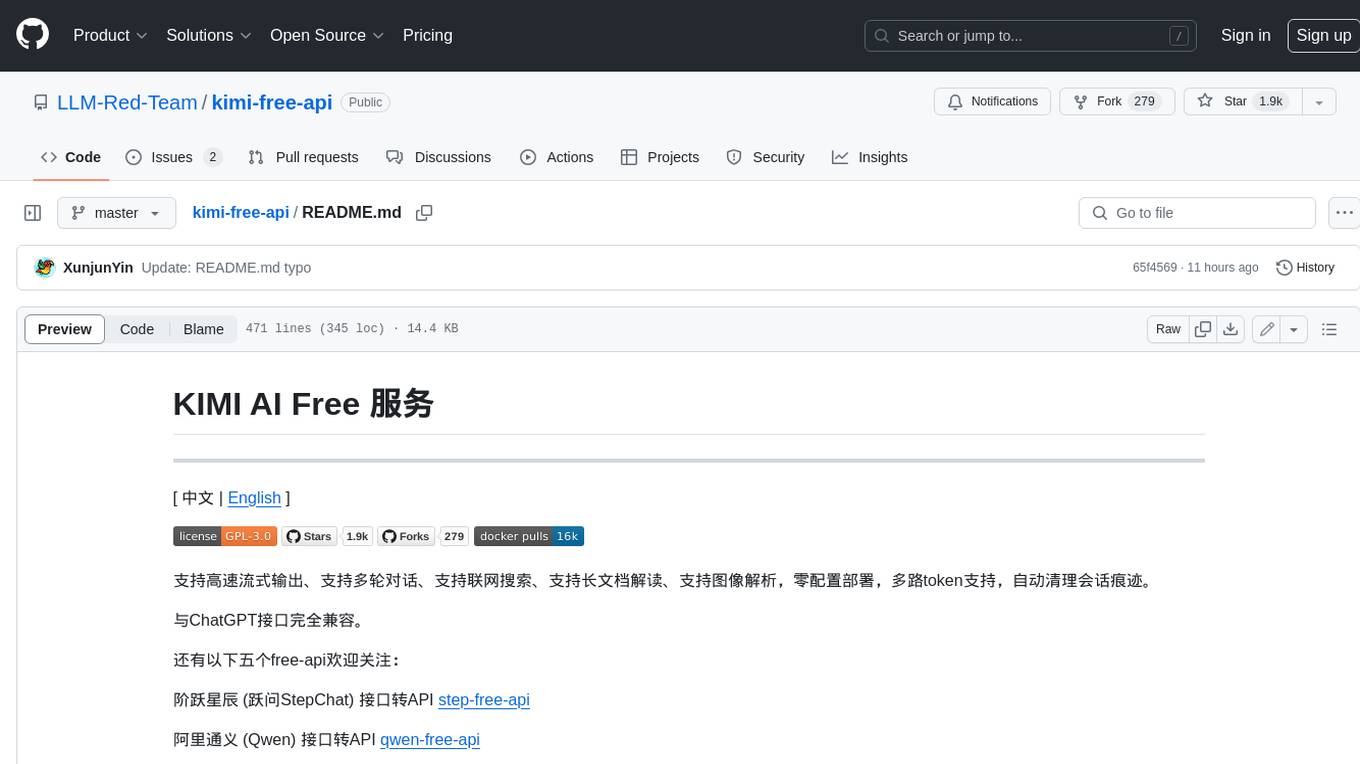
kimi-free-api
KIMI AI Free 服务 支持高速流式输出、支持多轮对话、支持联网搜索、支持长文档解读、支持图像解析,零配置部署,多路token支持,自动清理会话痕迹。 与ChatGPT接口完全兼容。 还有以下五个free-api欢迎关注: 阶跃星辰 (跃问StepChat) 接口转API step-free-api 阿里通义 (Qwen) 接口转API qwen-free-api ZhipuAI (智谱清言) 接口转API glm-free-api 秘塔AI (metaso) 接口转API metaso-free-api 聆心智能 (Emohaa) 接口转API emohaa-free-api
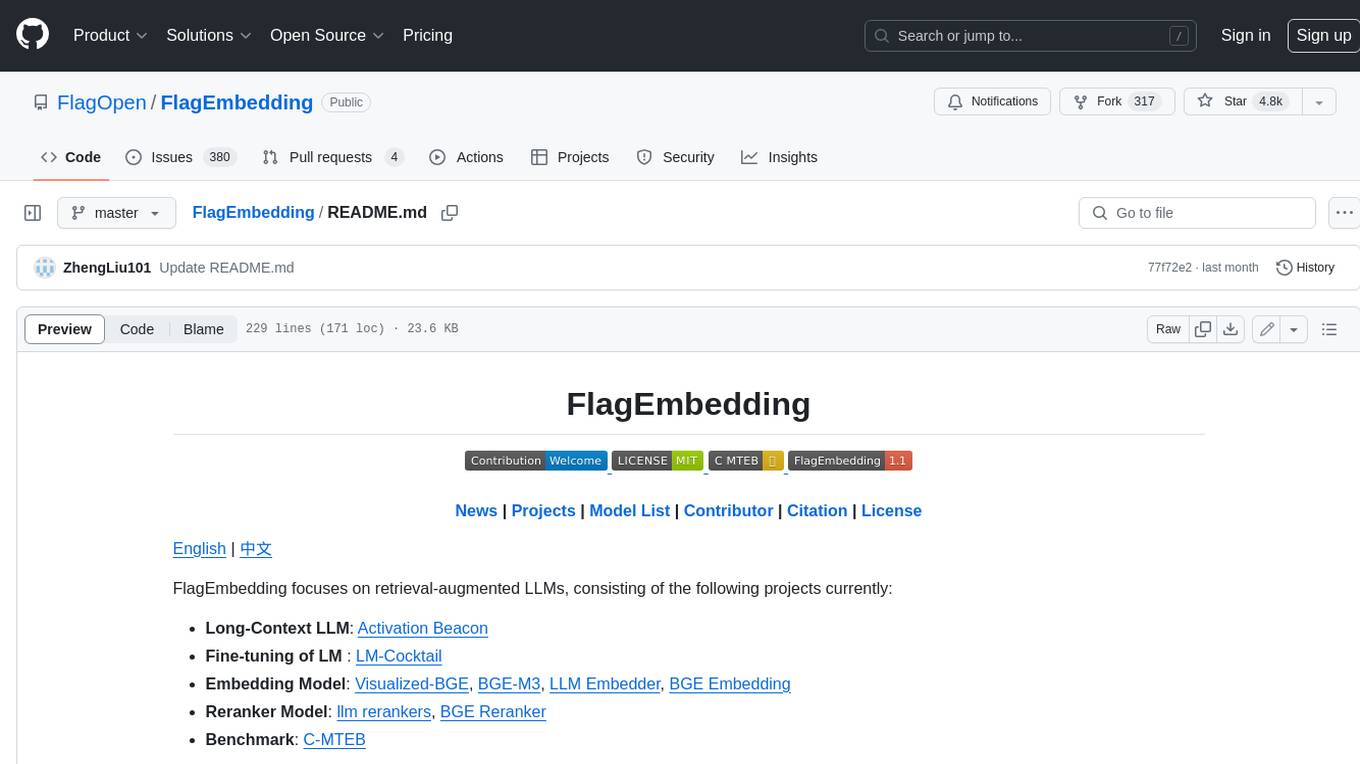
FlagEmbedding
FlagEmbedding focuses on retrieval-augmented LLMs, consisting of the following projects currently: * **Long-Context LLM** : Activation Beacon * **Fine-tuning of LM** : LM-Cocktail * **Embedding Model** : Visualized-BGE, BGE-M3, LLM Embedder, BGE Embedding * **Reranker Model** : llm rerankers, BGE Reranker * **Benchmark** : C-MTEB
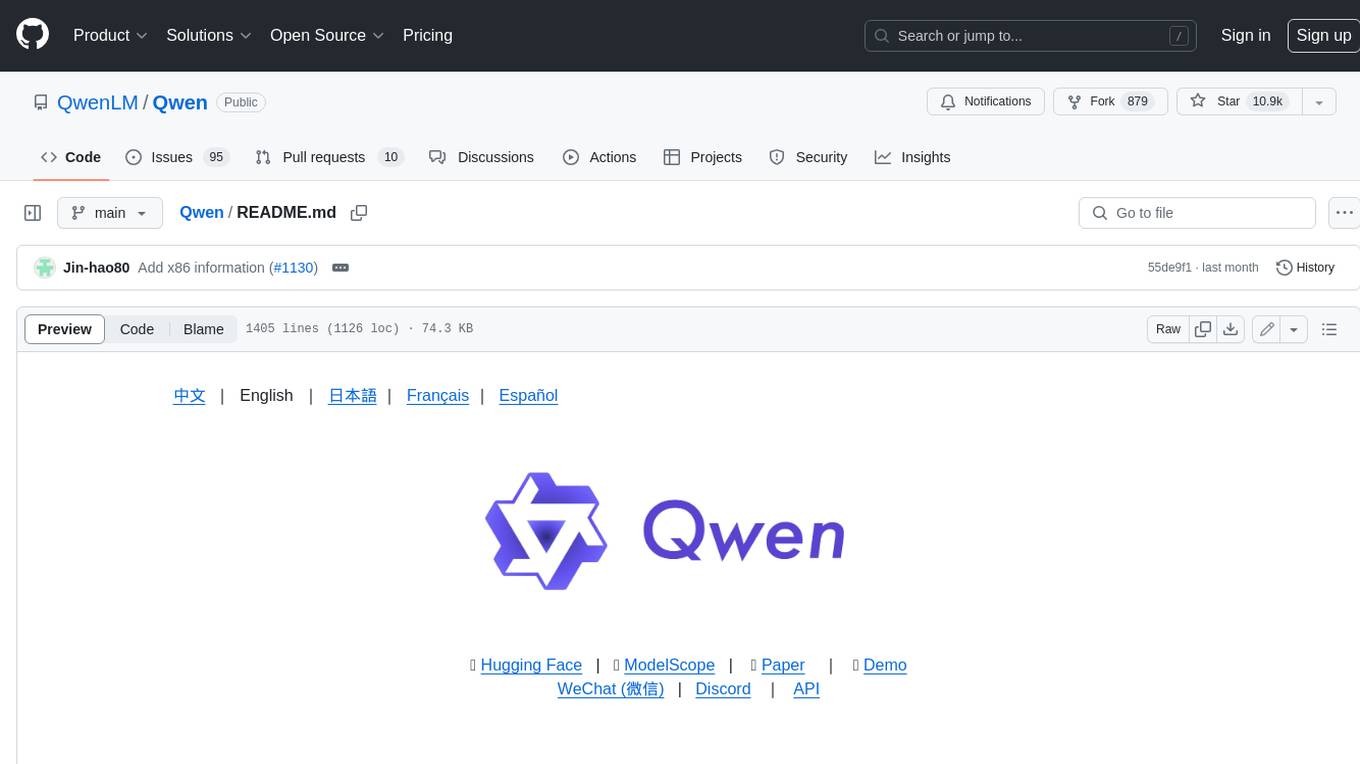
Qwen
Qwen is a series of large language models developed by Alibaba DAMO Academy. It outperforms the baseline models of similar model sizes on a series of benchmark datasets, e.g., MMLU, C-Eval, GSM8K, MATH, HumanEval, MBPP, BBH, etc., which evaluate the models’ capabilities on natural language understanding, mathematic problem solving, coding, etc. Qwen models outperform the baseline models of similar model sizes on a series of benchmark datasets, e.g., MMLU, C-Eval, GSM8K, MATH, HumanEval, MBPP, BBH, etc., which evaluate the models’ capabilities on natural language understanding, mathematic problem solving, coding, etc. Qwen-72B achieves better performance than LLaMA2-70B on all tasks and outperforms GPT-3.5 on 7 out of 10 tasks.

home-llm
Home LLM is a project that provides the necessary components to control your Home Assistant installation with a completely local Large Language Model acting as a personal assistant. The goal is to provide a drop-in solution to be used as a "conversation agent" component by Home Assistant. The 2 main pieces of this solution are Home LLM and Llama Conversation. Home LLM is a fine-tuning of the Phi model series from Microsoft and the StableLM model series from StabilityAI. The model is able to control devices in the user's house as well as perform basic question and answering. The fine-tuning dataset is a custom synthetic dataset designed to teach the model function calling based on the device information in the context. Llama Conversation is a custom component that exposes the locally running LLM as a "conversation agent" in Home Assistant. This component can be interacted with in a few ways: using a chat interface, integrating with Speech-to-Text and Text-to-Speech addons, or running the oobabooga/text-generation-webui project to provide access to the LLM via an API interface.
